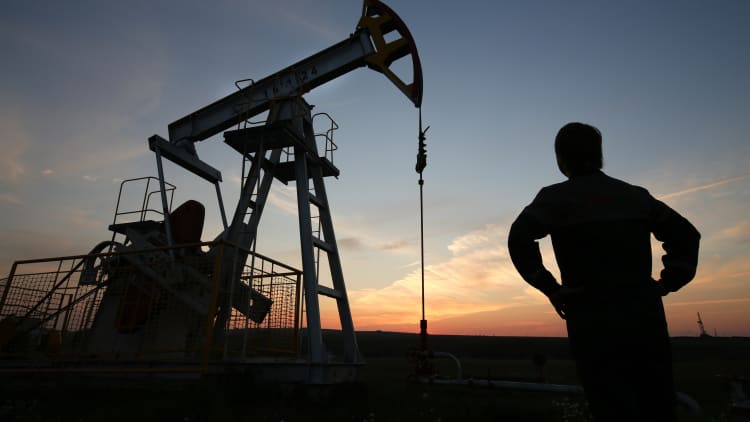Oil prices rose 3 percent on Friday as a report showing weaker U.S. jobs growth in August suppressed the dollar, but crude futures remained on track for a big weekly loss on glut concerns.
U.S. employment growth eased more than expected last month after two straight months of robust gains and wage gains moderated, casting doubts the Federal Reserve Open Market Committee will raise interest rates at its Sept. 20-21 meeting.
The dollar index weakened after the jobs report, making oil and other greenback-denominated commodities more affordable for holders of the euro and other currencies.
The number of oil rigs operating in U.S. fields rose by 1 to a total of 407, marking the ninth increase in 10 weeks following a flat reading last week, according to a weekly count from energy services provider Baker Hughes. At this time last year, drillers were operating 662 oil rigs.

Global benchmark Brent crude futures were up $1.27, or 2.77 percent, at $46.72 a barrel but were on course for a decline of more than 6 percent over the week.
U.S. West Texas Intermediate crude were up $1.28, or 2.97 percent, at $44.44 a barrel, on track for a 7 percent weekly loss.
"With the FOMC likely to stay in September and the dollar dictating where we could go, it's quite likely oil will hold at mid-$40 levels," said Carl Larry Director, director of business development for oil & gas at Frost & Sullivan.
"But more telling of how oil performs will be the rig count in coming weeks and OPEC gestures to support prices."
Oil rose earlier after Russian President Vladimir Putin told Bloomberg an agreement between oil exporters to freeze output would be the right decision to support the market. That report was published on the same day Russian Energy Minister Alexander Novak played down the potential for talks on a possible output freeze.
Those comments came amid growing skepticism among traders that the Organization of the Petroleum Exporting Countries (OPEC) and other producers including Russia will agree to freeze production at a meeting in Algeria later this month.
However, lending credence to a freeze, Saudi Arabia, the world's biggest crude exporter, has appeared to change its stance and is likely to support production stabilization at the meeting.

On Friday, Saudi Arabia's Foreign Minister Adel al-Jubeir said that he was optimistic about producers moving to a common position on oil production.
"We are beginning to have a meeting of the minds but it is a work in progress and we'll see what happens in the meeting in Algeria. And I'm hopefully optimistic," he told reporters.
OPEC members will discuss a potential production cap again at an informal Sept. 26-28 meeting in Algeria.
"The likeliest scenario is that there will be no freeze in production growth whatsoever," said Hans van Cleef, senior oil economist at ABN Amro.
It is more likely, he said, that participants will continue to monitor the market and possibly postpone freeze talks to the official OPEC meeting in Vienna on Nov. 30.
Additionally, more U.S. supply will return to the market as some producers in eastern parts of the Gulf of Mexico restart offshore operations as Hurricane Hermine made landfall in Florida and weakened into a tropical storm.

